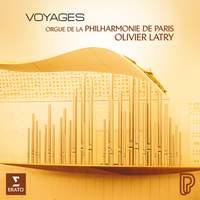Interview,
Olivier Latry on 'Voyages'
 Olivier Latry is one of today's most acclaimed organists, with numerous solo and collaborative albums to his name (particularly of the works of Messiaen) as well as a packed concert schedule.
Olivier Latry is one of today's most acclaimed organists, with numerous solo and collaborative albums to his name (particularly of the works of Messiaen) as well as a packed concert schedule.
His latest album puts the new organ of the Paris Philharmonie through its paces with a vivid selection of transcriptions of Romantic showpieces. I talked to Olivier about the relationship these have to their original versions, and about his approach to the glorious new instrument he has been showcasing.
The notes to this album make much of the unique personality of the particular organ you’re performing on. Do you think individual organs (and their buildings) have particular personalities? (Would you play these pieces differently on a German organ, for instance…?)
Yes, I think that each organ has its own personality. This is what makes an organist’s job so enjoyable! Each time we play a new organ, it’s like meeting a new person, trying to understand his/her personality, qualities, defaults: in a word, establishing a communication. Of course, an organ cannot speak - but it is clear that, when we listen carefully, we can hear that some registrations, some ways of playing are not suitable on a particular instrument. A little bit like if the instrument would tell us: “No, this way of playing doesn’t work with me. Try something else!” It is the best teacher… or a dumb chamber music partner!
Thus, the same repertoire performed on another type of instrument would sound totally different, for sure… Unless I would just change the repertoire, and play pieces which would fit better with the instrument.
Most of these transcriptions are by other people, but one – the Falla – is your own work. How did you approach the task of recreating the orchestral sound-world using the palette of the organ?
First, I must say that I haven’t transcribed many pieces myself, essentially because we can find many transcriptions already! When I do it, it is just because I think that this particular piece would sound great on the organ, and this is what happened with Falla: I “heard” the organ before making my own transcription, so the adaptation was not that difficult, because everything was already conceived in my head before I put my hands on the organ.
Do you worry that these works lose something ‘in translation’ when performed on the organ instead of in their original forms?
No instrument can compete with an orchestra. It is better to keep in mind that we should bring a new lighting on the piece than trying to imitate the orchestra: going that way would be a disaster! We should think about the orchestra at the beginning, but then turn to the organ, its possibilities, and how all can be combined. A “basic” approach would be just to use the same “instruments” familly: a reed stop when a brass is used on the orchestra, a flute stop for a flute, gambes or principals for strings… But this is the best way to make it NOT work, and not be especially convincing. On the organ, we have the possibility to create our own orchestration, and this is what makes the process of the transcription so exciting.
When I play a transcription of a piano piece on the organ, I think that it is easier to “forget” the original, because the piano doesn’t have that possibility to bring so many colours as the organ does. With Mendelssohn, for example, the registration gives its character to each variation; with Debussy, the piece sounds like its original purpose, the power of this big Cathedral emerging from water, and disappearing as it grows up.
It’s noticeable that many of the pieces you play on this album are vivid, pictorial works – the Saint-Saëns, the Khatchaturian, the Rimsky-Korsakov and others. Did you choose them intentionally for these qualities?
Not really. My purpose was to find pieces with the maximum of colours, to show all the possibilities of the magnificent organ at the Paris Philharmonie. But you may be right that those pieces belong to the pictorial works category!
'Voyages' was released on 20th January on Erato
Available Formats: CD, MP3, FLAC, Hi-Res FLAC, Hi-Res+ FLAC



